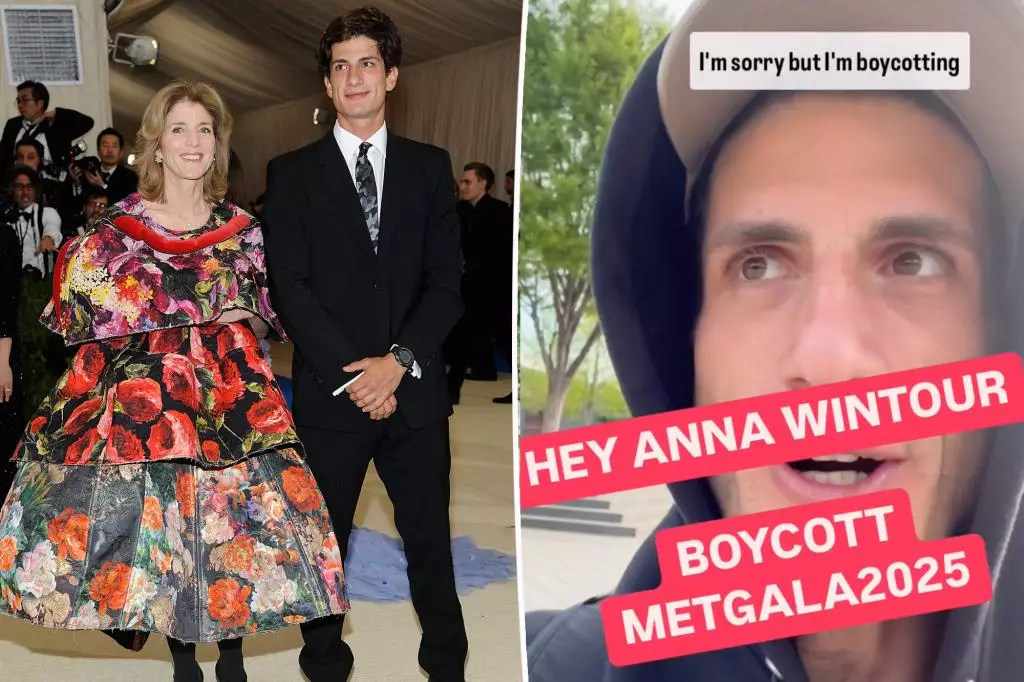Jack Schlossberg, grandson of former President John F. Kennedy and son of Caroline Kennedy, has taken to social media to express his disdain for an event that epitomizes high fashion and glitz: the Met Gala. Despite not being on the guest list this year, Schlossberg proclaimed a “boycott” of the event, positioning himself as a voice for change against what he perceives as an apathy within the fashion industry. It’s a bold move, especially from someone who has previously walked the red carpet at this prestigious occasion.
Schlossberg’s tirade began with an Instagram post where he articulated his reasons for this boycott. “With so much happening at home and around the world, it’s not the time for a party like that,” he emphasized emphatically. His sentiments, while potentially genuine, raise the question of whether this is more about genuine concern or a calculated move to draw attention to himself, given his lack of an invitation this year.
Fashion as a Political Tool
One of the core arguments Schlossberg presents is the idea that fashion is inherently political. His critique does not just target the gala itself, but extends to Vogue, a publication he previously contributed to. “Fashion is political – so then why is Vogue so quiet?!” he wrote provocatively. This statement captures the tension between fashion as an art form and its role in societal issues. Is the mainstream fashion industry too caught up in corporate interests to genuinely engage with the pressing matters of our time? Schlossberg seems to think so.
It’s fascinating to consider the implications of Schlossberg’s commentary. Fashion houses often hold significant power and influence, and when they turn a blind eye to important political issues, it could be perceived as complicity in the status quo. For Schlossberg and others who share his viewpoint, there’s a pressing need for fashion to be a force for social justice, rather than merely a vehicle for profit.
The Mechanics of Invitation
There’s an interesting contradiction in Schlossberg’s stance. Though he advocates for change, the reality of his absence from the guest list highlights the exclusivity and logistical intricacies of the gala. The Met Gala operates much like a tight-knit club, where invitations are primarily extended through connections with high-profile designers and brands. Thus, the validity of Schlossberg’s claims becomes muddled; an influential voice seems irrelevant if not actively engaged in the channels of power.
Sources noted that his previous invitation was more a courtesy extended as his mother’s plus one than an acknowledgment of his own standing in the fashion world. This context reveals that while he is leveraging his lineage, his fall from grace could stifle his ability to catalyze the change he advocates for.
Digital Activism or Self-Promotion?
Schlossberg hasn’t shied away from using social media as a platform for his thoughts. However, one can’t help but question whether this campaign is an authentic expression of concern or an opportunity for self-promotion. His posts about boycotting the event, including a photo of him paddleboarding, seem to tread a fine line between being a radical activist and a digital influencer seeking the limelight.
Moreover, the announcement of his intention to produce content for his own news channel adds another layer to his motivations. Is he genuinely interested in producing ‘something informative,’ or is this just a clever marketing ploy under the guise of activism? As the line between social responsibility and self-interest blurs in the digital age, Schlossberg’s actions invite scrutiny.
The Cultural Impact of the Met Gala
The Met Gala, famed for its lavishness and as a benchmark of fashion innovation, represents a cultural touchstone in more ways than one. This year’s theme, “Superfine: Tailoring Black Style,” seems to underscore the necessity of diverse representation in fashion. Ironically, the very event Schlossberg is criticizing is an opportunity for voices from marginalized backgrounds to be heard.
It raises a deeper question: As Schlossberg critiques the industry from the outside, how might he facilitate meaningful dialogues from within? If his desire is to highlight social injustice through fashion, perhaps involvement might pave a more effective path for those changes he aspires to see. Thus, the conversation should evolve beyond social media spats and boycotts and move toward constructive engagement aimed at reforming the characteristics of fashion itself.

